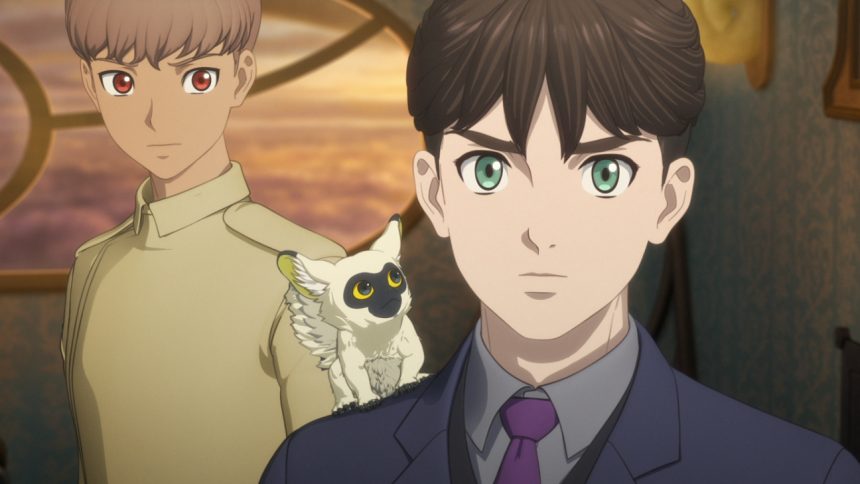‘Leviathan’ Producers on How the Diesel-Punk Netflix Anime Delivers Its Message of Hope
In a series of panels over two days at Anime Expo, Qubic Pictures and Studio Orange producers unpacked their international approach on- and off-screen to adapting Scott Westerfeld’s Leviathan trilogy into a diesel-punk Netflix anime show about “hope” and “overcoming differences.”
Set in an alternate 1914 on the eve of World War I, Leviathan imagines the Central Powers of the Austro-Hungarians and Germans — or “Clankers” — have built diesel-driven war mecha (giant robots), while the Triple Entente of the British, French and Russian Empires, dubbed the Darwinists, have genetically engineered animal creatures for use in battle.
The series follows Aleksandar “Alek” von Hohenberg, a fugitive prince from the Austro-Hungarian Empire on the run after his people turn against him, and Deryn Sharp, a commoner girl who has disguised herself as a boy to join the British Airship Navy. The two meet unexpectedly via a British bionegineered airship known as the Leviathan, kicking off a journey that will change the course of the war.
“This story is about two people who come from two different worlds who find themselves in this grand adventure and realize that they have a lot more in common than the world leads them to believe,” executive producer Justin Leach told the Petree Hall crowd during a post-premiere conversation at the L.A. Convention Center. “It’s a story of understanding and also finding yourself set in a historical drama tied to a world war.”
You Might Also Like
“It’s a story about trying to have the same experience, eat the same food, travel together and experience different things together,” Studio Orange producer Yoshihiro Watanabe shared during the separate “The Global Producer: Making Animation Across Borders” panel earlier in the day. “I felt that this is a story that needs to be told now. We are in a world where we need to be more open to things.”
The anime was five years in the making for Qubic Pictures CEO Leach, with Orange working for three years on development. According to Watanabe, the decision to board Leviathan came around the time they were working on Beastars’ second season. “We felt that with how we approach things, we wanted to [work on] a theme that really is something global and universal, and that is not affected by time,” he said during the producers’ panel, before adding at the Leviathan premiere, “I was like, ‘This is our next step. We want to give our 100 percent to make this something special.’”
Based on Scott Westerfeld’s trilogy of the same name, the author and the books’ illustrator, Keith Thompson, played significant roles in shaping the anime adaptation. “They were there from the very beginning, so we would share all the drafts of the scripts early on,” Leach said. “They were great partners, and … valuable resources during the production.”
The anime, which was produced using a CinemaScope format to “create a very cinematic theatrical experience” according to Leach and Watanabe, is helmed by an international team. There are not only American and Japanese producers, but Scottish and French producers leading a crew from Japan, as well as other parts of Asia, South America, and Europe. “A thing that’s also really fun about the show is that we get to travel all around the world. There are several locations, starting in Scotland, Istanbul, Paris, and other parts of the world, before we end up in New York, which — it’s just really cool to see this alternate New York,” he added.
Watanabe noted that Leach and series director Christophe Ferreira worked to help sow the connections between the anime’s various locations and cultures through narrative elements, including the show’s music, which features work by legendary Studio Ghibli composer Joe Hisaishi. For the Studio Orange producer, there was a strong desire to create a track with Hisaishi that could “connect everyone” in the series and those watching. “This is a story about various classes, different places, and in our real world, there are cases where music connects us. Even when we think it’s something different, it might be the same thing,” the Orange producer said.
“The theme is that sometimes we may appear different, or we might seem like we’re singing a different song, but in actuality, we are singing the same song,” Leach shared during the producer’s panel. “It’s about coming together and realizing that we share these common bonds as humans living on this planet.”
While finding the similarities despite people’s differences is often at the center of the series, Leach noted that creating a “visual language to make [the Clankers and Darwinists] feel very separate” was key to Westerfeld and thus the show. “It was really important to create these two contrasting worlds in this conflict,” the EP explained. “The Clankers are very angular and boxy and cold, and the Darwinists have the more organic shapes that are connected to nature. So in the design of the ship, you’ll see sort of the Nautilus pattern.”
Finding ways to make those cultures distinctive was also present in other aspects of the production, with Watanabe noting that the sound design on the show was helmed by one of Japan’s top sound designers, who created a “cue that’s intended for the Clankers and the Leviathan, which really subconsciously tells me a lot about each side.” Leach added that “because we paid a lot of attention to different countries, we wanted to make sure that each country had their own visual style, so we hired different designers to handle different regions.”
Leviathan’s international approach, Wantanabe said at two separate Friday panels, exemplifies the message at the heart of the story. “Everyone’s bringing their culture onto this,” he explained. “Leviathan is about overcoming the differences, and trying to see the same vision.”
“We want to leave you with a message of hope,” Leach later added. “It just felt like a good time to spread that message.”







